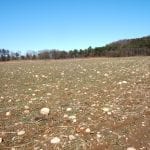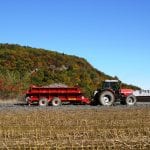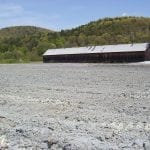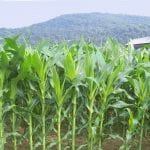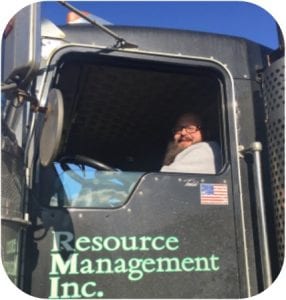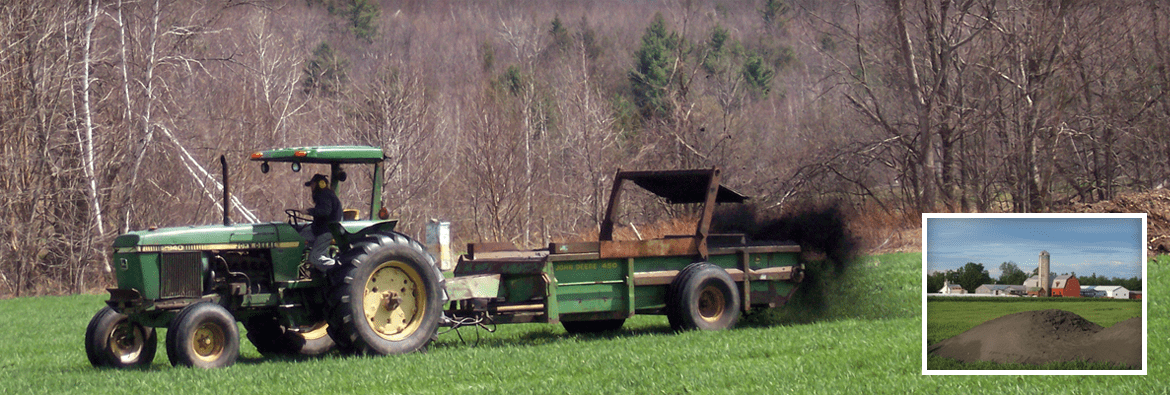
Building Organic Matter and Improving Soil
Soil in New England is often acidic and not optimal for crop production. Paper Fiber, a soil amendment derived from paper production, can assist in improving the fertility of topsoil. The use of Paper Fiber will increase the pH of soil. Paper Fiber is spread on farm fields with the use of conventional agricultural equipment, and a typical application rate of ten tons per acre provides two tons of lime value. In addition to increasing soil pH, Paper Fiber adds organic matter to soil. Organic matter in topsoil serves several important functions — it influences the release of nutrients over time, enhances the water-holding capacity of the topsoil, and improves erosion resistance. As organic matter breaks down, it slowly makes nutrients like nitrogen and phosphorus available to the crop. Increasing the water holding capacity of topsoil improves drought resistance and helps prevent the loss of nutrients through leaching. Erosion resistance is enhanced by the cellulose in Paper Fiber, which assists with slope stabilization and minimizes run-off in storm events. The use of Paper Fiber has also been documented to increase the percent crude protein in corn silage. Evaluating the overall fertility of the soil is the first step toward enhancing both the soil health and crop yields. Let our qualified Field Services Team come out to your farm and take soil samples so we can help determine what is needed for your cropping plan!
RMI Partners with Northfield Mount Hermon School
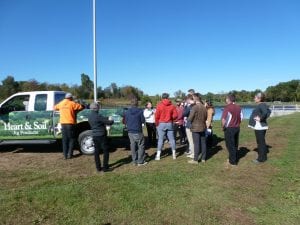
This fall RMI partnered with the Northfield Mount Hermon (NMH) School located in Gill, MA to clean out their sewage lagoons. Because this project to empty the lagoons only happens every 15 years, some of the faculty on campus decided to use the opportunity as a “teachable moment”. Several classes toured the lagoon and learned how the system works and the importance of investing in infrastructure to clean our wastewater and protect the Connecticut River watershed. Many of the students did not realize that their daily showers and flushes are piped down the hill from campus and are treated through a biological lagoon system to convert their waste into microbes and a final fertilizer product called biosolids. Recycling the biosolids is part of a long-term commitment to sustainable practices at NMH.
This project was particularly fun for RMI President Shelagh Connelly as she graduated from NMH in 1982 and currently has a daughter who is graduating next spring. “It was nice to be able to work for the school that was pivotal in getting me on the environmental track so long ago.”
NEBRA – Managing Residuals in a Complex World Conference
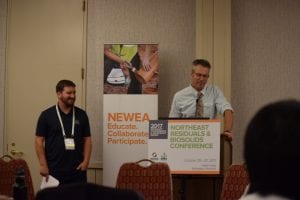 At the recent North East Biosolids and Residuals Association (NEBRA) Conference in Burlington, Vermont Mike Potash, RMI Certified Crop Advisor and Andrew Carpenter, RMI Consultant and owner of Northern Tilth, presented their research regarding hydrosolids, or water treatment residuals. Their research focuses on reducing plant-available phosphorous in agricultural soils by land applying hydrosolids. Four corn silage fields were selected for trials from farms in both NH and VT. All of these fields have a long history of using manure and/or biosolids as primary sources of soil fertility. After two years of applying hydrosolids and testing the soil regularly it was clear that the hydrosolids did play an important role in reducing plant-available phosphorous, which in turn will help protect water quality surrounding agricultural areas.
At the recent North East Biosolids and Residuals Association (NEBRA) Conference in Burlington, Vermont Mike Potash, RMI Certified Crop Advisor and Andrew Carpenter, RMI Consultant and owner of Northern Tilth, presented their research regarding hydrosolids, or water treatment residuals. Their research focuses on reducing plant-available phosphorous in agricultural soils by land applying hydrosolids. Four corn silage fields were selected for trials from farms in both NH and VT. All of these fields have a long history of using manure and/or biosolids as primary sources of soil fertility. After two years of applying hydrosolids and testing the soil regularly it was clear that the hydrosolids did play an important role in reducing plant-available phosphorous, which in turn will help protect water quality surrounding agricultural areas.
To learn more about their research please head to https://tinyurl.com/ybx4sqke to read their presentation.
Legislative Hurdles in 2017
In 2017 there were several bills introduced in NH and VT that could have had potentially profound impacts to three recycling programs which have been successfully operating for decades (wood ash, biosolids, and paper fiber recycling). In NH SB 129 was critical to the survival of six independent wood-fired power plants operating in New Hampshire. Without these power plants, New Hampshire would have lost most of its low-grade timber markets, and without these markets, forestry and timber management would no longer be affordable. Also in NH, biosolids land application along designated rivers was finally approved on a permanent basis eliminating the need to go back to the legislature every five years for renewed approval. In Vermont H.211 was a single bill with five different parts jumbled together but had the phrase “to develop a plan to reduce or phase out land application of sludge and septage” which legislators did not really seem to understand the impact to farmers, municipal wastewater treatment facilities, and paper mills. Once they heard from their constituents they tabled the bill for further study.
It was a busy legislative season and there are lessons to be shared about the importance of staying engaged with our elected representatives at the local, state and federal level. Hosting the annual Water’s Worth It legislative breakfasts, going to the National Fly-In with New England Water Environment Association, and collaborating with NEBRA are all critical for success in the legislative process.
RMI Hosts Spreader Demo
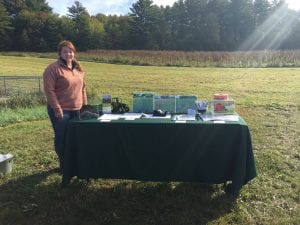
On September 22, 2017 Brandy Thomas, RMI Sales Representative, and Mike Potash, RMI Certified Crop Advisor, hosted a Wood Ash Spreading Demonstration at Middle Intervale Farm in Bethel, Maine. Brandy and Mike focused on the benefits of wood ash being able to renew soil fertility and pH balance. Wood ash is the best source of organic potassium for farms, it is fast-acting and quickly raises soil pH making nutrients in the soil more available to plants.
Meet Todd Gammell!
Todd has been driving for RMI for a little under a year. He services almost all of out generators throughout New England and has racked up 50,000 miles, 1600 hours and delivered 355 loads of Heart & Soil Ag. Products to our loyal customers. Todd is a great addition to RMI and we love having him on our team!
Thanks for keeping us rolling!
